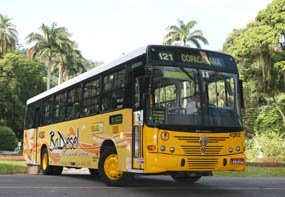- Back to Home »
- EMBRAPA Agro-energy
 The Brazilian federal government created an agro-energy unit for the Brazilian Agricultural Research Corporation (Embrapa). The new unit was announced last week, during the celebrations for the corporation's 33rd anniversary.
The Brazilian federal government created an agro-energy unit for the Brazilian Agricultural Research Corporation (Embrapa). The new unit was announced last week, during the celebrations for the corporation's 33rd anniversary.
EMBRAPA Agroenergia will be in charge of coordinating agro-energy research. Four major work groups will be formed: alcohol and energy derived from sugarcane; biodiesel from animal and plant sources; forest biomass; and agricultural and agribusiness waste products.
The government announced also the formation of the National Consortium of Agro-energy, which will have the aim of organising and motivating the research and production of alcohol fuel and biodiesel together with the private sector.
The new EMBRAPA unit will help the country achieve the government's official goal of achieving a 2% mixture of biodiesel with diesel fuel by 2008 (around 800 million liters altogether) and a 5% mixture by 2011. Meanwhile at Rio de Janeiro the RioBiodiesel program prepares to launch the second biodiesel urban bus. The vehicle fuel, composed by 95% of metropolitan Shell diesel (with low sulphur emission) and 5% of soybean oil was developed at IVIG an Energy and Climate Change Research Laboratory at Federal University of Rio de Janeiro in a parternship with, Volkswagen (vehicle), INT - National Institute of Technology (design), MWM (engine) , Bosch (electronic injection), Shell (fuel), Mahle (fuel filter) and Faperj (research finance).
Meanwhile at Rio de Janeiro the RioBiodiesel program prepares to launch the second biodiesel urban bus. The vehicle fuel, composed by 95% of metropolitan Shell diesel (with low sulphur emission) and 5% of soybean oil was developed at IVIG an Energy and Climate Change Research Laboratory at Federal University of Rio de Janeiro in a parternship with, Volkswagen (vehicle), INT - National Institute of Technology (design), MWM (engine) , Bosch (electronic injection), Shell (fuel), Mahle (fuel filter) and Faperj (research finance).
The intention of the Rio de Janeiro government is to stimulate the entrepreneurs so that, in the Panamerican Games, in 2007, all the urban buses of the capital are circulating with biodiesel mixture.
* Embrapa - Brazilian Agricultural Research Corporation, networking through 37 Research Centers, 3 Service Centers and 11 Central Divisions, Embrapa is present in almost all the states of the Union, each with its own ecological conditions. There are 8,619 employees in Embrapa, of which 2,221 are researchers, 45% with master's degrees and 53% with doctoral degrees. Embrapa coordinates the National Agricultural Research System, which includes most public and private entities involved in agricultural research in the country.












